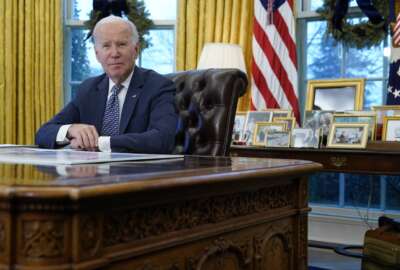
Earmarks returned big time to grease the latest budget negotiations
Earmarks, appropriations as favors to individual members of Congress, have made a big comeback. More than 7,000 worth billions in the latest deal. The Federal Drive...
Best listening experience is on Chrome, Firefox or Safari. Subscribe to Federal Drive’s daily audio interviews on Apple Podcasts or PodcastOne.
Earmarks, appropriations as favors to individual members of Congress, have made a big comeback. More than 7,000 worth billions in the latest deal. The Federal Drive got details from Bloomberg Government Congress reporter Jack Fitzpatrick.
Interview transcript:
Tom Temin
Well, tell us about this because earmarks had been sort of ruled out by Congress for what about a decade now? And it seems like they’ve thrown that to the wind as they’ve thrown all fiscal restraints to the wind, haven’t they?Jack Fitzpatrick
Well, yeah, they were they were banned for a decade really, in response to the Tea Party movement. It was 2011 when Republicans took the house at a big 2010 election, there was so much focus on fiscal conservatism at that time, they banned earmarks. Members had talked about bringing them back in some limited and more transparent way for a long time. This is now the second year of the newly instituted earmark system, no scandals so far, but it is proving to be popular. You know, last year, the first year they brought it back, they said, let’s limit this to no more than 1% of discretionary spending. And members were so careful that they only hit about two thirds of that 1% limit. This time, they’re closer to the limit by my count. Overall, this omnibus bill has about 15.3 billion and earmarks that 7,234 specific projects inserted by members, the limit would be about 17 billion according to their 1% limit. So they got a lot more requests in the second year of the new system. They approved more requests. And it’s it’s something that’s getting bipartisan support, Republicans were skeptical at first, they’ve kind of bought into it a bit more.Tom Temin
Right in theHouse side that sort of roughly so because it looks like the Democrats have maybe what 60% of the earmark dollars as your reporting, Republicans may be 30, you know, a third and then there’s a bipartisan piece.Jack Fitzpatrick
In the House, it’s roughly a 64 split, I believe Democrats voted maybe a little more than 60%. In the Senate. The Republicans had kind of talked their way into an more of an even split. It’s not quite 50/50. But they got almost half that was part of the discussion around having a 50/50 Senate trying to get buy in because Democrats didn’t want to do this system on their own. They really said we’re not going to be the ones to bring back earmarks if it’s going to be a partisan thing. So Republicans, especially in the Senate, the ones who participated really made out well, because fewer Republicans have bought in and said yes, I’m going to do this, but they talk their way into almost a 50/50 split. So if you look at the individual list of of the top earmarkers, it does happen to be Republican senators Richard Shelby, Jim Inhofe Lisa Murkowski, those types, and that’s because they’re trying to make it pretty equitable and almost an even split a bit of an advantage for Democrats, but almost even and there are fewer Republicans participating so far.Tom Temin
Richard Shelby of Alabama, of course is retiring after this term is retired basically now, and he got $666.4 million down there to Alabama. Sounds like there’s going to be a lot of Richard Shelby bridges, Richard Shelby schoolhouses, Richard Shelby highways.Jack Fitzpatrick
Yes. That was actually a joke that one of the conservative lawmakers criticizing this set, I believe it was Mike Lee, who was pushing to take the earmarks out saying evidently there’s something left to be named for Richard Shelby and Alabama. He’s the highest ranking Republican on the Senate Appropriations Committee. Even outside of earmarks, he’s managed to bring a lot of money back to Alabama. He has downplayed the importance of earmarks in this bill in his last go around. But yes, $666.4 million. For some big budget stuff. There’s $200 million in there for the Alabama State Port Authority. Over the last two years, he’s managed to get some big chunks of money for infrastructure and some for universities in Alabama. And it is a sort of a legacy builder.Tom Temin
Sure if there’s the Richard Shelby dead squirrel by the side of the road, the Richard Shelby tin can. We’re speaking with Jack Fitzpatrick, Bloomberg Government’s Congress reporter and on the House side, again, a Texan from a Texan Republican Weber got $287 million for a district presumably so that on a percentage basis, he’s probably doing better.Jack Fitzpatrick
Yeah, Randy Weber made out pretty well his tended to be I believe it’d be more defense focused. And that’s one of the takeaways especially if you dig into the details on sort of the Republican and Democrat divide in the earmarks. You see more military construction earmarks, they banned the typical defense earmarks. None of this is going to defense contractors, but they can do stuff at military bases. That was a popular one for some of the larger Republican earmarks. So that’s that’s why you see somebody like Randy Weber, who’s a pretty defense focused lawmaker. Getting 287 and a half million. Meanwhile, the Democrats tended to go there’s also infrastructure, more domestic focused less for the military and other things through community development museums, police equipment, fire station, that kind of stuff. Those are some of the most popular things as I looked through a very long list of earmarks.Tom Temin
Yes. And what was their justification? Because before the return of earmarks, they would say, well, because we can’t get a budget done on time, there’s no grease anymore. And the earmark was the grease, now two years in a row with earmarks at a very large scale. And yet, they’re still playing brinksmanship, with government shutdowns and so forth. And it took till you know, darn near the end of the year really to get this all done. So what’s the justification? How are they explaining this? Or does anybody care?Jack Fitzpatrick
There are a couple of justifications. And there was a debate over this because House Republicans just a month or so ago, had to vote on whether to allow earmarks in the new Congress, because they’re taking the majority of the House for one, you know, they banned earmarks for a decade, and that did not take care of the debt and deficit is a whether you see a project here or there, that appears to be a good idea or bad idea, you know, $15 billion, on top of a $1.7 trillion funding package is not exactly the driver of the debt. Two, the money after they decide the top line spending figure for the federal government, the money is going to be spent. And if you carve out 1% of that, for earmarks, that takes some power away from the executive branch, there were a ton of complaints from lawmakers, including Republicans, saying the Army Corps of Engineers, the Department of Transportation, would not always be responsive to projects that lawmakers thought were very important, and a really influential lawmaker could go to them and maybe through backdoors, get them to approve something on the Army Corps work list. Other rank and file members wanted the chance to say in a limited way, all right. I don’t want to just depend on President Biden to choose what gets funded, we should have a little bit of a chance for lawmakers to say, hey, this bridge in my district is very important.Tom Temin
All right. So enjoy the money, I guess as it’s flowing. And it looks like these are back permanently. I mean, we can see this whenever they get around to the budget for 2024. Presumably a year from now. This is going to be this is they’re back, right?Jack Fitzpatrick
Yeah, the outlook is pretty positive for the supporters of earmarks that they vote. About three quarters of the House Republican Conference voted against a ban on earmarks. You see more Republicans this year than last year participating. So it is bipartisan, especially the decision by Republicans in the House who are taking the majority to continue this makes it appear to be definitely a bipartisan trend and something that is trending in an upward direction with limits, but it doesn’t appear to be going away. And there’s not a ton of talk about reviving a ban.
Copyright © 2025 Federal News Network. All rights reserved. This website is not intended for users located within the European Economic Area.
Tom Temin is host of the Federal Drive and has been providing insight on federal technology and management issues for more than 30 years.
Follow @tteminWFED
Related Stories





